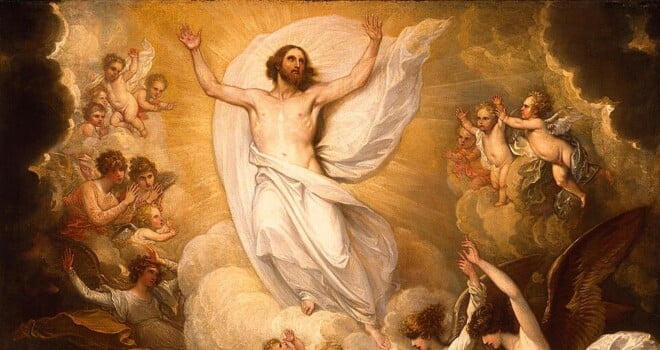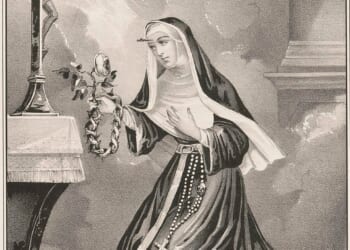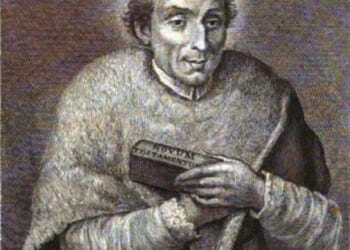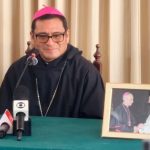By choosing the name Leo, our new pope has placed himself in line with one of the most brilliant theologians of the Ascension, Leo the Great (391–461). The first Pope Leo preached ardently on the centrality of this mystery, emphasizing that it was precisely during the forty days after Jesus’s Resurrection that the Lord designated Peter as “Rock” and entrusted the keys to him (cf. Sermon 73). Leo XIV must certainly have this in mind as he prays over the Scriptures this Easter season.
But Leo the Great also has something to say to all of us as we attempt to wrap our minds around the stunning event of Jesus’s resurrection. How could Jesus possibly come back to life? What does it mean? How are our lives changed by it? Leo the Great did not take these questions lightly.
In two marvelous sermons, he addresses them in the context of the forty days Jesus spent with His disciples after His Resurrection and before ascending to heaven. It is hard to imagine the grief, terror, and despair the disciples must have felt after Jesus’s passion. A time of encouragement and healing was needed, a time for their faith to be rekindled and their hearts determined to announce the Good News. Leo even states that we should be thankful the Apostles were so slow to believe: “Others doubted, that we might not doubt” (Sermon 73).
Forty days were needed to persuade the Apostles that Jesus had risen in the flesh and was not a ghost. Thomas was able to probe the nail marks in His hands and feet. The disciples on the road to Emmaus were able to walk with Him and share a meal with Him. The central message of Jesus’ post-resurrection teaching, Leo says, is that “the nature which had been laid in the tomb was to sit on God the Father’s throne” (Sermon 73).
A particular insight of Leo is that the Ascension in no way diminished the disciples’ joy in the Resurrection, but increased it. Listening to the Lord and spending time with Him during those forty days prepared the disciples to see that human nature goes up with Jesus into heaven to sit with God the Father whose glorious divinity Jesus fully shares. “The nature of our humility in Christ was raised above the host of heaven . . . to sit with God the Father” (Sermon 74).
The Ascension is also a time to appreciate more deeply the reason for the sacraments. “That which till then was visible of our Redeemer was changed into a sacramental presence, so that faith might be more excellent and stronger.” Too often we think that faith is nothing more than a will to believe in the absence of physical proof. But we know faith is much more than that. Faith is trust in the person of Jesus. Faith is an abiding relationship with Him. Although it is true that faith waits for perfection, faith is also a perfected relationship with the One who is fully present among us in the sacraments. The Ascension assures both the disciples and us that the Lord Jesus is indeed not only as active, but indeed more active in the lives of believers.
As we continue to rejoice in the gift of Pope Leo XIV, Leo I reminds us that the Ascension assures us of the need for Apostolic teaching and a firm adherence to what has been passed on to us through the Apostles. At the Ascension, “sight gave way to doctrine,” in that what was once visible through the physical eyes of the Apostles is now spiritually visible to us through the eyes of faith.
Leo also emphasizes the crucial importance of the Ascension to help us raise our eyes away from our cellphones towards heaven. Everything we seek to be nourished by and everything we delight in must have heaven as its source and aim. There is no better antidote to secularism than the Ascension, since it is ultimately the Ascension that teaches us the secularity of the secular. “Minds that have heard the call to be uplifted,” Leo says, “must not be pressed down by earthly affections; they that are fore-ordained to things eternal must not be taken up with the things that perish” (Sermon 74).
My son’s First Holy Communion last week reminded me that it is we, the adults, who are “pressed down by earthly affections,” not the kids. Yes, it’s true that he and his three younger sisters loath getting into the car on Sunday. Mass is long, boring, and their tummies are rumbling. But what’s true on one side of the equation is as true on the other. After receiving the Body of Christ, tears of joy moisten his eyes as he skips back to the pew, reveling in the merciful love of Jesus filling his soul. Kids are not weighed down by the distractions that weigh us down: bills to pay, family to care for, aching muscles, parking spaces to find, and so much more.
Pope Leo warns us that such distractions, though normal, are anything but neutral, for the devil delights in “fettering souls that strive after things above . . . and drawing them away from those abodes from which he himself was banished” (Sermon 74).
The purpose of life is to get to heaven. But the purpose of the Ascension is to remind us that, in Jesus’s humanity seated next to the Father, we are already “there.” By being “there,” we, in Jesus, already participate in the Father’s divinity, especially through the reception of the Sacraments. Leo teaches us that they alone are the source of boundless charity in this life, and thus the very means by which we can defeat the Evil One. For “there is no more powerful weapon . . . against the devil’s wiles than kindly mercy and bounteous charity, by which every sin is either escaped or vanquished” (Sermon 74).
Image from Wikimedia Commons














